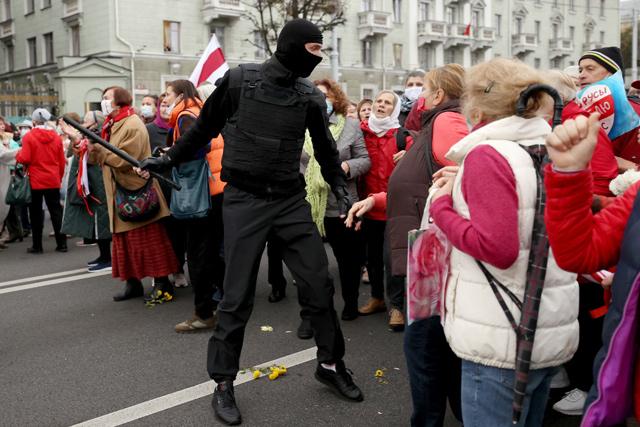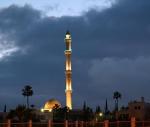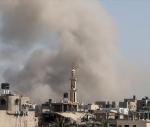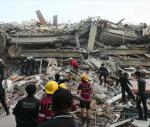You are here
Belarus threatens to fire on anti-Lukashenko protesters
By AFP - Oct 12,2020 - Last updated at Oct 12,2020

Belarusian pensioners argue with a law enforcement officer during a rally to demand the resignation of authoritarian leader and new fair election in Minsk, on Monday (AFP photo)
MINSK — Belarus on Monday threatened to fire on protesters to break up demonstrations against President Alexander Lukashenko, as EU foreign ministers agreed to impose sanctions personally targeting the strongman leader.
The use of live firearms would mark a major escalation in the two-month stand-off between Lukashenko and protesters, who have staged peaceful rallies against his disputed reelection in August and against the abuse and torture of detainees.
The warning came after security forces cracked down harshly on new anti-Lukashenko protests on Sunday, prompting EU foreign ministers to agree it was time to sanction Lukashenko himself. Belarus pensioners also held the latest in a series of regular protests on Monday to demand new elections and the resignation of Lukashenko.
Belarus's First Deputy Interior Minister Gennady Kazakevich said in a video statement that "we will not leave the streets and law enforcement officers and internal troops if necessary will use riot control equipment and lethal weapons".
Police have so far only acknowledged using water cannon, rubber bullets and stun grenades to disperse the protesters.
Kazakevich claimed that protests had become "extremely radical" with stones and bottles thrown at police on Sunday by protesters armed with knives, who built barricades and set fire to tyres.
"This has nothing in common with civil protest," the deputy minister said, claiming that "groups of fighters, radicals, anarchists and football fans" were taking part.
Harsh crackdown
He said Belarus was facing attempts to revive the "chaos of the 1990s" and foment the "colour revolutions" that have toppled pro-Kremlin leaders in other ex-Soviet states.
His statement came as police used some of the harshest tactics yet against protesters at large marches on Sunday.
Police deployed water cannon and stun grenades in Minsk and detained more than 700 people across the country, the interior ministry said.
The crackdown ended any expectations that a bizarre prison visit by Lukashenko to hold over four hours of talks with critics held in jail at the weekend marked any change in approach.
Two entrepreneurs with links to the opposition who took part in the meeting were moved to house arrest after the talks.
On Monday, Tut.by independent news site reported that police apparently used pepper spray and a stun grenade in Minsk as black-clad men in balaclavas detained demonstrators during marches by pensioners and students.
Kazakevich's statement was the first time authorities have explicitly threatened to use firearms against opposition demonstrators.
The Nasha Niva independent newspaper on Sunday posted a video in which internal troops appear to run towards demonstrators while threatening them with guns, however.
When protests broke out in August, police acknowledged opening fire on protesters in the southern city of Brest, killing one, though it was unclear whether live bullets were used.
They said they acted in self-defence as the men were armed with iron bars, while family members of the deceased man said he had simply been walking along the street.
Lukashenko sanctioned
Peaceful protests broke out after Lukashenko claimed victory in August 9 elections over a popular opposition candidate, Svetlana Tikhanovskaya, who claims to be the true winner.
European foreign ministers on Monday agreed Lukashenko's name should join a list of 40 of his officials already sanctioned by the EU with travel bans and asset freezes, diplomatic sources said.
The EU had held back from penalising Lukashenko himself, hoping to persuade him to engage in dialogue with opposition forces to resolve the crisis. But the treatment of demonstrators on Sunday proved the last straw.
German Foreign Minister Heiko Maas said earlier that the Belarusian leader should be among those sanctioned as "the violence continues, perpetrated by the Lukashenko regime".
The EU, along with the United States and other countries, has rejected the results of the August 9 election and said it did not regard Lukashenko as the legitimate president.
Lukashenko has been president of his country wedged between Russia and the EU since 1994, holding on to power through a combination of strongman tactics and sometimes wily diplomacy.
Analysts say the protest movement is keeping him under pressure but the continued backing of the security forces, and for the moment key ally Russia, is allowing him to stay in power.
Related Articles
MINSK — Police deployed water cannon and stun grenades against opposition demonstrators in Minsk on Sunday after President Alexander Lukashe
MINSK — Tens of thousands of Belarusian opposition supporters gathered for the largest protest rally in recent history in Minsk as President
MINSK — Opposition protesters in Belarus took to the streets of capital Minsk on Sunday in the latest of three months of demonstrations agai


















